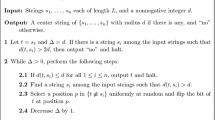Abstract
Mutation region detection is the first step of searching for a disease gene and has facilitated the identification of several hundred human genes that can harbor mutations leading to a disease phenotype. Recently, the closest shared center problem (CSC) was proposed as a core to solve the mutation region detection problem when the pedigree is not given (Ma et al. in IEEE ACM Trans Comput Biol Bioinform 9(2):372–384, 2012). A ratio-2 approximation algorithm was proposed for the CSC problem in Ma et al. (IEEE ACM Trans Comput Biol Bioinform 9(2):372–384, 2012). In this paper, we will design a polynomial time approximation scheme for this problem.



Similar content being viewed by others
References
Abecasis, G., Cherny, S., Cookson, W., Cardon, L.: Merlin-rapid analysis of dense genetic maps using sparse gene flow trees. Nat. Genet. 30, 97–101 (2002)
Gudbjartsson, D., Jonasson, K., Frigge, M., Kong, A.: Allegro, a new computer program for multipoint linkage analysis. Nat. Genet. 25, 12–13 (2000)
Lander, E., Green, P.: Construction ofmultilocus genetic linkage maps in humans. Proc. Natl. Acad. Sci. 84, 2363–2367 (1987)
Kruglyak, L., Daly, M., Reeve-Daly, M., Lander, E.: Parametric and nonparametric linkage analysis: a unified multipoint approach. Am. J. Hum. Genet. 58, 1347–1363 (1995)
Lathrop, G., Lalouel, J., Julier, C., Ott, J.: Strategies for multilocus linkage analysis in humans. Proc. Natl. Acad. Sci. 81(11), 3443–3446 (1984)
Leykin, I., Hao, K., Cheng, J., Meyer, N., Pollak, M., Smith, R., Wong, W., Rosenow, C., Li, C.: Comparative linkage analysis and visualization of high-density oligonucleotide SNP array data. BMC Genet. 6, 7 (2005)
Cai, Z., Sabaa, H., Wang, Y., Goebel, R., Wang, Z., Xu, J., Stothard, P., Lin, G.: Most parsimonious haplotype allele sharing determination. BMC Bioinform. 10, 115 (2009)
Lin, G., Wang, Z., Wang, L., Lau, Y.-L., Yang, W.: Identification of linked regions using high-density SNP genotype data in linkage analysis. Bioinformatics 24(1), 86–93 (2008)
Wang, L., Wang, Z., Yang, W.: Linked region detection using high-density SNP genotype data via theminimum recombinantmodel of pedigree haplotype inference. BMC Bioinform. 10, 216 (2009)
Qian, D., Beckmann, L.: Minimum-recombinant haplotyping in pedigrees. Am. J. Hum. Genet. 70(6), 1434–1445 (2002)
Tapadar, P., Ghosh, S., Majumder, P.: Haplotyping in pedigrees via a genetic algorithm. Hum. Hered. 50, 43–56 (2000)
Zhang, L., Sun, F., Zhao, H.: HAPLORE: a program for haplotype reconstruction in general pedigrees without recombination. Bioinformatics 21, 90–103 (2005)
Doi, L., Li, J., Jiang, T.: Minimum recombinant haplotype configuration on tree pedigrees. In: Proceedings of Workshop on Algorithms in Bioinformatics (WABI), pp. 339–353 (2003)
Li, J., Jiang, T.: Computing theminimum recombinant haplotype configuration from incomplete genotype data on a pedigree by integer linear programming. J. Comput. Biol. 12(6), 719–739 (2005)
Li, J., Jiang, T.: An exact solution for finding minimum recombinant haplotype configurations on pedigrees with missing data by integer linear programming. In: Proceedings of the Eighth Annual International Conference on Resaerch in Computational Molecular Biology (RECOMB), San Diego, California, USA, pp. 20–29 (2004)
Xiao, J., Liu, L., Xia, L., Jiang, T.: Fast elimination of redundant linear equations and reconstruction of recombination-freemendelian inheritance on a pedigree. In: Proceedings of the Eighteenth Annual ACM-SIAM Symposium on Discrete Algorithms, New Orleans, Louisiana USA, pp. 655–664 ( 2007)
Ma, W., Yang, Y., Chen, Z., Wang, L.: Mutation region detection for closely related individuals without a known pedigree using high-density genotype data. IEEE ACM Trans. Comput. Biol. Bioinform. 9(2), 372–384 (2012)
Cui, W., Wang, L.: Identifying mutation regions for closely related individuals without a known pedigree. BMC Bioinform. 13, 146 (2012)
Chen, Z., Ma, W., Wang, L.: The parameterized complexity of the shared center problem. Algorithmica 69(2), 269–293 (2014)
Gusfield, D.: Inference of haplotypes from samples of diploid populations: complexity and algorithms. J. Comput. Biol. 8(3), 305–323 (2001)
Gusfield, D.: Haplotype inference by pure parsimony. In: Combinatorial Pattern Matching. Springer, Morelia, Michocan Mexico, pp. 144–155 (2003)
Wang, L., Xu, Y.: Haplotype inference by maximum parsimony. Bioinformatics 19(14), 1773–1780 (2003)
Roach, J., Glusman, G., Hubley, R., Montsaroff, S., Holloway, A., Mauldin, D., Srivastava, D., Garg, V., Pollard, K., Galas, D., Hood, L., Smit, A.: Chromosomal haplotypes by genetic phasing of human families. Am. J. Hum. Genet. 89, 382–397 (2011)
Bansal, V., Bafna, V.: HapCUT: an efficient and accurate algorithm for the haplotype assembly problem. Bioinformatics 24, i153 (2008)
Chen, Z., Deng, F., Wang, L.: Exact algorithms for haplotype assembly from whole-genome sequence data. Bioinformatics 29, 1938–1945 (2013)
Li, M., Ma, B., Wang, L.: On the closest string and substring problems. J. ACM 49, 157–171 (2002)
Karmarkar, N.: A new polynomial-time algorithm for linear programming. Combinatorica 4, 373–395 (1984)
Motwani, R., Raghavan, P.: Randomized Algorithms. Cambridge University Press, Cambridge (1995)
Gillman, D.: A Chernoff bound for randomwalks on expanders. In: Proceedings of the 34th Annual Symposium on Foundations of Computer Science, pp. 680–691 (1993)
Acknowledgments
The work is fully supported by a grant from the Research Grants Council of the Hong Kong Special Administrative Region, China (Project No. CityU 122511), a grant from City University of Hong Kong (Project No. 9610025) and a grant from National Science Foundation of China (Project No. NSFC 61373048).
Author information
Authors and Affiliations
Corresponding author
Rights and permissions
About this article
Cite this article
Li, W., Wang, L. & Cui, W. A Polynomial Time Approximation Scheme for the Closest Shared Center Problem. Algorithmica 77, 65–83 (2017). https://doi.org/10.1007/s00453-015-0057-z
Received:
Accepted:
Published:
Issue Date:
DOI: https://doi.org/10.1007/s00453-015-0057-z




